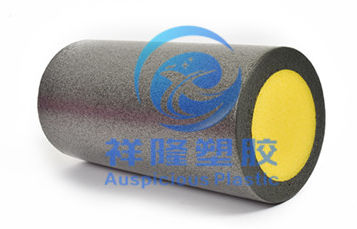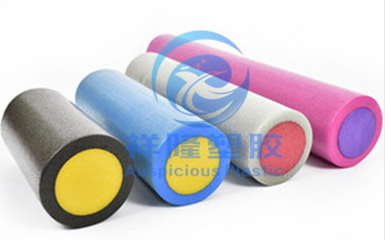1、What is
PE foam roller?
PE foam roller is also called foam column, foam roller, cylindrical roller, yoga shaft. PE foam roller is mainly available in 2 shapes: cylindrical and semi-circular, with a standard diameter of about 15cm and 3 lengths of 92cm, 46cm and 36cm. The characteristics are: non-invasive, non-invasive, easy to carry. In short, PE foam roller rolling exercise is a kind of stretching technique for fascial relaxation adopted by athletes or physiotherapists after sports.

2、The role mechanism of PE foam roller & foam axis rolling technology
The role and mechanism of PE foam roller
(1) Pain relief
The application of PE foam roller reduces the sensitivity of nociceptive nerve endings and increases the pain pressure threshold.
(2) Improve flexibility and increase joint mobility
The constant pressure of PE foam roller on soft tissues can suppress pain sensation, regulate the nervous system through pain relief, and increase the tolerance of muscle stretching and nerve adaptation.
(3) Accelerate recovery after training
(2) Friction exists between connective tissue and PE foam roller, and PE foam roller rolling increases muscle temperature and blood circulation, promotes venous and lymphatic return, and has an accelerating effect on the excretion of metabolic waste.
(4) Reduce muscle spasm and prevent sports injury
Through local rolling and pulling, the foam roller can: effectively stimulate the Golgi tendon organ to produce excitation, inhibit the pulling reflex, reduce the tension of muscles and tendons, regain the functional length of muscles, and achieve the corrective effect of fascia and mechanics.
PE foam roller relaxation movements are generally divided into 2 levels.
Level1】Low difficulty version
The movement bears a low proportion of its own weight, the pressure exerted on the muscles is relatively small, more suitable for people who have just started to use PE foam roller.
Level2】High difficulty version
It is more suitable for people who have used PE foam roller for a period of time.
PE foam roller rolling training is also divided into two types.
Static relaxation method
Roll the PE foam roller to the muscles that need to be relaxed and meet the painful area.
Staying at the painful point for 20 to 60 seconds until the pain level decreases by about 50% to 75%.
Dynamic relaxation
Using your own weight, roll the PE foam roller slowly for about 1~2 minutes.

4、Common errors in use
(1) Rolling too fast
Rolling too fast may be their own pressure is not enough, not enough pressure ≈ massage is not deep, only in the skin shallow, and did not achieve deep relaxation.
The correct approach: let the superficial fascia and muscle have time to adapt. When you find a local area of greater tension (pain is obvious), you can move the foam axis for a short distance.
(2) Spending too much time on fixing "muscle nodes"
If you feel a "point", you can spend a moderate amount of time using the PE foam roller to relax on the point. Some partners will spend 5~10min, or even longer time on this point. However, continuous pressure in this area may touch the nerve or damage the soft tissue, resulting in bruising.
(3) Direct rolling pressure on the painful area
When we feel tension in our body, the first reaction is to massage the painful point directly (feel that soreness), which may be a big mistake. An area of pain may be the result of an imbalance in another part of the body.

 Language
Language Language
Language Home > News
Home > News

View More(Total0)Comment Lists